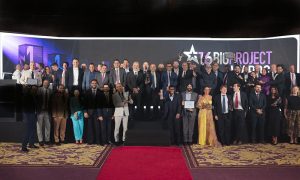Think globally, act locally: Delivering projects across borders
Lucynda Jensen, Project Lead, Project & Development Services UAE at JLL shares insights on the development of projects

Despite local variations, the construction sector has become increasingly global and universal in nature over the years. The trend has significantly impacted employment, making it easier for workers to move from market-to-market, carrying a global mindset while acting locally.
Unlike the past, most occupiers and investors now choose to operate outside their home markets. The widespread adoption of global standards has opened new horizons for qualified employees to work worldwide.
The opportunity to take on project assignments abroad and learn different ways of working has always been a selling point for the construction industry, which is less constrained by local regulations and practices than other competing sectors such as finance and law.
Human resource professionals and in-house recruiting teams leverage this trend to attract and retain key talent. JLL recognised this trend early on and offers formal and informal programmes to promote employee movement between offices. On a personal note, I have worked in three different regions in my 16 years in the construction sector. A similar experience is typical for many of our team members in the Middle East.

While working with cross-cultural teams can be challenging for some, it presents opportunities for creativity and learning from others in best practices, standards, and approaches, bringing different perspectives that benefit clients.
As there are similar challenges in project delivery worldwide, technical skills learnt in Amsterdam or Austin apply equally to projects in Abuja, Ahmedabad or Abu Dhabi. Some common issues faced in the life-cycle of every project include scope gaps, mismatched budget against actual costs, value engineering and unrealistic time-frames of project principles.
Meanwhile, the increasing use of technology, such as Building Information Modelling (BIM), has further pushed the trend towards more open borders in the construction sector. For example, our JLL teams have been applying property technology developed in the US on mega projects across GCC countries.
The race toward zero-carbon buildings is another contributor to the increased globalisation of the construction sector. This will likely remain front and centre of the industry for many years, as the focus shifts from individual buildings to precincts, communities and entire cities. While UK and USA green building certification programs such as LEED and BREAM are widely used globally, many countries, including the UAE, have developed local rating systems such as Estidama, which practitioners familiar with international standards will have an easy understanding of and apply local variations.

What differs between markets even today is contractual arrangements. While Joint Contracts Tribunal (JCT) dominates the UK market, most projects in Asia and the Middle East use the International Federation of Consulting Engineers (FIDIC) approach. Traditionally, FIDIC contracts were for engineering projects and JCT for construction, with FIDIC being the choice internationally. However, as both contracts inherently deal with change and delay, this is not a major constraint to the ability of qualified workers to work across markets.
Consequently, there has been a clear breakdown of barriers and increased opportunities for cross-border work within the construction sector over the past decade. This trend is likely to continue due to several factors, such as: energy efficiency targets are becoming an increasingly important differentiator to commercial developments and city master plans; shift towards repurposing of existing buildings – it’s not all about the delivery of new projects and, the increasing need for energy-efficient and environmentally-compassionate masterplans in developing countries – meaning the need for expertise from across the world in their delivery.
In the end, despite increased digital delivery techniques, construction will broadly remain a people’s business. Moreover, the quality of a team will always play a critical role in the delivery of successful projects. And businesses that recognise the increasingly globalised marketplace and build project teams with diverse skill sets and cross-learning experience will likely be the most resilient.
Read more:
- Omnix to enhance Digital Maturity Index within regional AEC firms
- JLL appoints Larry Baker to develop data centre business in the MEA region
- How data-driven programme management ensures every project hits the ground running























